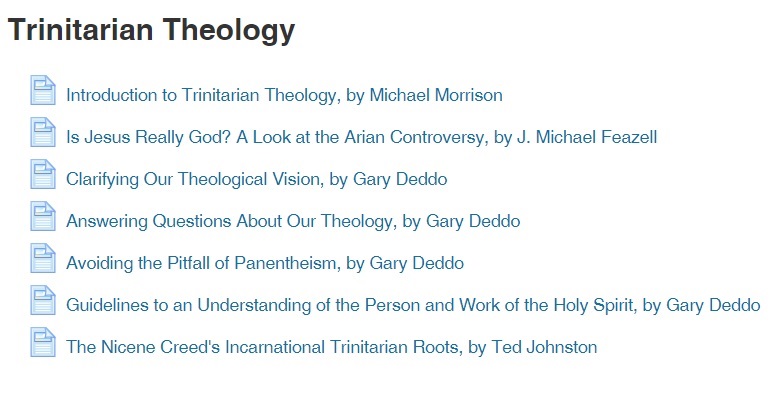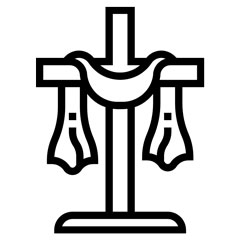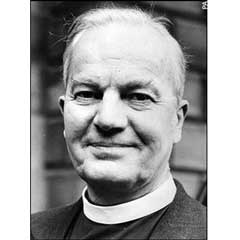Available courses

This page includes articles about Trinitarian theology, biblical studies, and an introduction to the GCS program.

Interviews with Trinitarian theologians. Most are available in video and audio; all are available as edited transcripts. Most are about 28 minutes long.

This section contains information to help students navigate the website, download lecture material, and post assignments. We provide links to the GCS library and we list our faculty and staff.

This course surveys various methods of analyzing the
biblical text and
discusses how to use various forms of analysis in exploring the original
meaning and contemporary applications of biblical passages. [Short syllabus]
- Professor: Michael Morrison

This course will plunge you into a quick trip through the Old Testament (Hebrew Bible) in which you will gain an overview of the varied genres, themes, structures and core messages of this fascinating anthology of sacred writings. Spanning many centuries, the books of the Old Testament are marvelously diverse in their historical, geographical, cultural and textual settings. [Short Syllabus]
- Professor: Jeannine Graham

This course studies the prophetic literature of the Hebrew Canon, the Former and Latter Prophets in order to grasp the foundation and formation of the kingdom of God. We will seek to apprehend the establishment and development of the monarchy with Ancient Israel as moved by the renewal of the Biblical Covenant Relationship that we are taught by the Prophets. [Short syllabus]
- Professor: Timothy Finlay

This course gives students an overview of the New Testament documents: the authors, dates, places, genre, structure, and themes. Attention is given to individual documents, and how the documents work together for canonical unity. [short syllabus]
- Professor: Michael Morrison

- Professor: Michael Morrison

This course examines the four canonical Gospels to see what each of these four portraits of Jesus tells us. Students will explore the literary and theological relationships between the Gospels, and the major themes each one presents. Students will describe how the teachings of Jesus can be used in our very different circumstances today. [full syllabus]
- Professor: Michael Morrison

This course chronicles the characters and events in the book of Acts to study the early development of the Christian church from its Jewish base to the inclusion of all peoples. The lives of the apostle Peter and apostle Paul set the background for studies of the General Epistles and Pauline Epistles. [Short syllabus]
- Professor: Dan Rogers

This course examines the 13 letters attributed to Paul in the New Testament. Students will learn the circumstances in which each letter was written - the problems Paul was attempting to address and the way he responded to them. Lessons will include questions of date and authorship, theological considerations involved in what Paul wrote, and how students find modern significance in these letters. Prerequisite: BI501 Biblical Interpretation. [short syllabus]
- Professor: Michael Morrison
This course uses an inductive approach to learning New
Testament Greek, discussing features of Greek as they occur in the letter of 1
John. Bible study websites and programs supply information about declensions
and conjugations, so we will focus on how we can use that information to understand
how the words work together to convey meaning. We will learn the words used
frequently in this letter. [short syllabus]
- Professor: Michael Morrison

This course allows students to study additional materials and perform additional research relevant to areas of interest, primarily in topics for which GCS does not have a specific course. This course may carry from one to four units in biblical studies or theology. Prerequisite: at least two previous courses in the discipline, with a grade of B or better. [syllabus]

This course introduces New Testament Greek, focusing on nouns and present- and future-tense indicative verbs. [Short syllabus.]
- Professor: Michael Morrison

Church History 1: The First Millennium is a survey of the events, people, and ideas of Christianity from Jesus’ ascension to the “Great Schism” of 1054. The focus is on mastering the key events and cultural contexts of the period as well as introducing the student to the writings, leaders and theology of the church’s first millennium. Proctored Exam. [Short syllabus]
- Professor: Stephen Dolson-Andrew

This course surveys the Western Church from the time of the first Crusade (1095) down to today's latest renewal movements. "The Church reformed must always reform itself" is a central theme. It addresses the Western Church at the height of its power, the crisis that triggered the Reformation and the “great ideas” of Luther and Calvin. It examines the Enlightenment, the rise of Science, and pivotal American experience. Cultural influences, theology, and grass-roots spirituality are seen as dynamically interacting in this broad overview. Proctored Exam. [Short syllabus]
- Professor: Stephen Dolson-Andrew

This course seeks to integrate a biblical, Christ-centered, and historically orthodox theology, grounded on the reality revealed in Jesus’ birth, life, death, resurrection, and ascension along with his promise of personal return, with Christian ministry encompassed by worship, fellowship, discipleship, service, and witness. Through this integration a foundational understanding of the identity and purpose of the church will be explored along with ministerial implications for pastoral leaders and lay members alike. [Short syllabus]
- Professor: Lance McKinnon

This course examines a multi-disciplinary approach to counseling drawing on insights from Scripture, incarnational Trinitarian theology, and psychology regarding God, humanity (including sin, human change and well-being) and Christian ministry. Application of these insights is then made to the practice of short-term, church-based counseling ministries that participate effectively, through the Holy Spirit, in the ongoing ministry of Jesus Christ, the "Wonderful Counselor." [Short Syllabus]
- Professor: Ted Johnston

This course helps students develop an Incarnational Trinitarian theological approach to several common elements of pastoral ministry, including administration of baptism and the Lord’s Supper, worship planning, preaching, pastoral care, evangelism, discipleship, church administration, and family ministry. [Short Syllabus]
- Professor: Ted Johnston

This course explores the issue of women and men serving together as leaders in the church. Students will survey biblical evidence about women in leadership. Discussion will include differences in the way that women and men tend to think, and challenges that women often face in this role that has historically been dominated by men. [Short syllabus]
- Professor: Michael Morrison

This course examines the relationship of theology and youth ministry practice as it has developed in North America. The course explores the centrality of Jesus in all ministry in the relationship that Jesus already has with young people. That relationship is explored in its post-Christian, post-modern cultural context, with an emphasis on the importance of mentoring as a relational/incarnational tool in youth ministry. [Short Syllabus]
- Professor: Jeffrey Broadnax

This course studies spiritual formation. Participation is required in an online three-day retreat that presents students with the opportunity to come to know God more intimately through silence, solitude, meditative prayer, communion, worship, and other spiritually formative activities. This retreat experience is informed by a study of the dynamic of these practices as they relate to Scripture and the call of the Triune God to know him better. [Short Syllabus] See below for Video Introduction. [Video Intro]
- Professor: Larry Hinkle

This course explores the practical application of starting new churches that are centered on Jesus Christ, culturally relevant, share the gospel, make disciples, and continue to multiply new churches. Principles and practices discussed in this course can be applied by pastors and ministry leaders to help established congregations participate more effectively in Jesus’ mission and prepare to “re-plant”, i.e. relocate a congregation to more effectively participate in Jesus’ mission to a focus group or community. [short syllabus]
- Instructor: Randy Bloom

This course is designed to help students understand denominational life and polity within Grace Communion International. We will give the student an overview of the church’s history, its leaders, and its theological journey. The primary objective of the class is to help the student get a better understanding into the culture and organizational structure of Grace Communion International and then to ably function within the denominational system. [short syllabus]
- Professor: Greg Williams

This course surveys various methods of analyzing the biblical text in order to develop an expository sermon to be given to a congregation. This course also surveys various approaches to the sermon and analyzes which approaches work best in various contexts. This course involves instructor evaluation of video sermons prepared and submitted by the student to the instructor, and the critique by an ecclesiastical supervisor and by the instructor of a sermon (submitted on video) given by the student to a congregation/audience. Prerequisite: BI501. [short syllabus]
- Professor: Dan Rogers

This
course will train students to lead a small group for church congregations that
are centered around Bible studies that contribute to a growing faith, hope and
love for Jesus Christ. Students will learn and practice the skills needed to
prepare for and lead Bible studies that foster fellowship, spiritual maturity
and a vision for service, outreach and mission. [short syllabus]
- Professor: Cathy Deddo
- Professor: Gary Deddo

Trinitarian Worship explores in depth the who, what and how of the church’s corporate (public) worship. Exploring the who takes us to the theological foundations that undergird Christian worship. We’ll see that this worship flows from and is shaped by incarnational Trinitarian faith—the knowledge of the triune God revealed in the person and work of Jesus. Throughout the course, we’ll emphasize that Christian worship is our participation, by the Holy Spirit, in Jesus’ ongoing worship of the Father. [Short Syllabus]
- Professor: Lance McKinnon

This course surveys various methods of analyzing the biblical text and discusses how to use various forms of analysis in exploring the original meaning and contemporary applications of biblical passages. [Short syllabus]
- Professor: Charles Fleming

This course is designed to help GCI denominational and administrative leaders to learn deeper levels of leadership, especially centered around the finer aspects of what we see revealed in the Gospels about Jesus Christ. The student will be challenged to take an inventory of their personality, grow in self-awareness, and use this understanding to improve their leadership. The course will review the leadership structure of the denomination and examine the job descriptions of various church offices. The primary objective is to help the student to become a leader worth following because they are walking in the footsteps of Jesus.
- Professor: Greg Williams
This course integrates learning from biblical, theological, and ministry studies into a research thesis that explores one aspect of ministry. This three-unit course often covers two semesters, and it is conducted as an independent study under the guidance of the professor. Prerequisite: Student must have at least 36 units, and must pass a summative exam. [short syllabus ]
- Professor: Lance McKinnon

FE501 is two credit hours per semester. Students are to reflect on the Incarnational Trinitarian theological foundations of their ministry work and how their ministry work is centered in Christ. The course entails 90 hours of student work per semester on a ministry-related project. The course includes 1) developing and implementing a Ministry Action Plan (MAP) for a project, 2) forum discussions, and 3) a project summary/reflection paper, which integrates the student’s previous academic studies with the ministry projects they select. Prerequisite: CM501 and must have completed at least 30 units. [short syllabus]
- Professor: Jeffrey Broadnax

FE502 is two credit hours. Students are to reflect on the incarnational Trinitarian theological foundations of their ministry work and how their ministry work is centered in Christ. This course entails 90 hours of student work on a ministry-related project. The course includes developing and implementing a Ministry Action Plan for a project, forum discussions, and a project summary/reflection paper, which integrates the student’s previous academic studies with the ministry projects they select. Students should select only one ministry project for FE502; the project for FE502 must differ from that for FE501. Prerequisite: CM501, FE501, and 32 or more hours of previously earned academic credit. [short syllabus]
- Professor: Jeffrey Broadnax

FE503 is two credit hours per semester. Students are to reflect on the incarnational Trinitarian theological foundations of their ministry work and how their ministry work is centered in Christ. The class entails 90 hours of student work on a ministry-related project. The course includes developing and implementing a Ministry Action Plan (MAP) for a project, forum discussions, and a project summary/reflection paper, which integrates the student’s previous academic studies with the ministry projects they select. Prerequisites: CM501, CM504, FE501, FE502. The project for FE503 may be a repeat (updated and improved) of a project done for FE501 or FE502. [short syllabus]
- Professor: Jeffrey Broadnax

In this course we will consider who the God revealed in Jesus Christ is and who we are in relation to God. We will especially focus on the triune being and character of God, the purpose and work of creation, and God’s sovereign and providential oversight of it throughout history. We will also consider the nature of humanity (according to the image of God), the nature of sin and evil and the fall, and our knowledge of God through the written Word of God and natural means. Finally, we will consider the nature of theological reflection and its place in the faith, worship and witness of the Christian life.
[Short syllabus]- Professor: Gary Deddo

This course explores the person and work of Jesus Christ the incarnate Son of God according to biblical revelation. In that light we also consider the nature of the salvation accomplished and offered in and through Jesus Christ and by the Holy Spirit. This will include reflecting on the nature of human beings, of evil, and the inherent effects of sin. Issues of predestination and how we receive and participate in that saving relationship with our Triune God are studied.
[Short syllabus]- Professor: Gary Deddo

This course covers the doctrine of the Holy Spirit, the Christian understanding of the church, and Christian teaching about biblical eschatology. [Short syllabus]
- Professor: Gary Deddo
- Professor: Lance McKinnon

This course explores in depth the Christian doctrine of the Holy Trinity, with its biblical foundations in God's revelation, the nature of theology, the foundational historic creeds and controversies, key elements and current obstacles to a fully Christian faith in the Triune God. This course examines vital implications of the doctrine of the Trinity for ethics, worship, the church and proclamation of the Gospel of the Grace of God through Jesus Christ in the Spirit. Prerequisite: at least one previous theology course.[Short syllabus]
- Professor: Gary Deddo

In this course we will survey C.S. Lewis’s primary works and two of his fictional works to see how Lewis understood the central tenets of Christian faith and their inter-relationships. We will consider how Lewis communicated the Christian faith in his context through his fiction and how we might more faithfully communicate the Christian gospel in our day. [short syllabus]
- Professor: Gary Deddo

This
course surveys the Christological thought of theologian Thomas F. Torrance with
a focus on the person, life and work of Jesus Christ. Consideration will also
be given to the topics of the church and eschatology (the last things), as
explicated in his two-volume series of edited lectures on Christology
originally delivered to students at New College, University of Edinburgh. [short syllabus]
- Professor: Gary Deddo
- Professor: Lance McKinnon

This course allows students to study additional materials and perform additional research relevant to areas of interest, primarily in topics for which GCS does not have a specific course. This course may carry from one to four units in biblical studies or theology. Prerequisite: at least two previous courses in the discipline, with a grade of B or better. [syllabus]
- Professor: Gary Deddo

This course describes the theological foundation for Christian ethics. We will identify and explore many modern approaches to ethics and see what difference a theological approach makes. We will also give extensive consideration to how pursuing moral faithfulness fits in with a life of discipleship to Jesus Christ and with the church’s worship and witness in this present fallen age. A number of contemporary moral issues will be addressed and there will be opportunities for students to look into several of personal interest and relevance to the church. Prerequisite: at least 30 units, including at least six units in Bible, six in theology, and three in ministry. [Short syllabus]
- Professor: Gary Deddo
This course integrates learning from biblical, theological, and ministry studies into a research thesis on a theological topic. This three-unit course normally covers two semesters, and it is conducted as an independent study under the guidance of the professor as the capstone course for the Master of Theological Studies degree. Prerequisite: Student must be within 6 units of completing the Master's program and must pass a summative exam. [short syllabus]
- Professor: Gary Deddo
- Professor: Lance McKinnon
This course integrates learning from biblical, theological, and ministry studies into a capstone paper that expresses one's theology of ministry. This course is conducted as an independent study under the guidance of the professor as the capstone course for the Master of Pastoral Studies degree. Prerequisite: Student must be within 6 units of completing the Master's program and must pass a summative exam. Students who want to write a thesis should register for CM549 Christian Ministry Thesis. [short syllabus]
- Professor: Lance McKinnon
This capstone course integrates previous academic work with ministry experience to reflect and evaluate the student’s educational progress towards biblically and theologically informed ministry applied in the student’s cultural context. Reflection will also evaluate the student’s call and giftedness for ministry in Jesus Christ. Throughout the course students will reflect on personal goals achieved in the degree program as well as critique areas of their own strengths and weaknesses. Students will define and analyze the cultural contexts in which they carry out both personal and professional ministry. [short syllabus]
- Professor: Lance McKinnon
Progress Report for 2024
Annual Progress Report for GCS.
Newsletters, list of graduates, graduation photos, and presidential changes.
This section contain information for faculty on course development, policies, presentation, and grading.